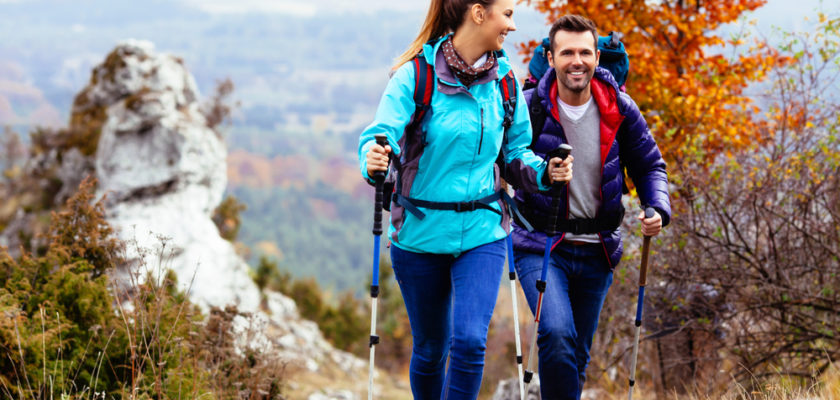We’ve most likely all been advised to try out hiking at some point in our lives—it might have been a kidding comment from a companion, or genuine advice from a health specialist. In any case, you should take the request truly, as hiking has numerous health benefits.
Besides the obvious advantage of getting some activity and outside air, this article states some amazing physical and mental health benefits you can get from hiking [1].
Here are 7 reasons that will motivate you to step toward arranging a nice hike whether it’s mid-year, winter, fall, or spring.
#1 – Hiking Burns Lots of Calories
Hiking is one of the fastest ways to burn calories and to keep weight under control.
Studies state that with a regular hiking routine, a 150 pound person can burn approx. 240 calories per hour if he or she hikes at a speed of 2 miles per hour. If you want to lose weight, start gradually and then increase your hiking hours to 60 minutes daily for best weight loss results [2].
You will be surprised to know that hiking burns significantly more calories than walking, and if you formerly trapped to walks in a park near home for workout, you are not expected to see a noticeable rise in your weight loss.
As the hills are inclined, walking your way up to a mountain summit or descending towards a lower point makes you work harder and sweat more than a walk on a flat surface.
So, put on your winter hiking boots and start your weight loss journey with a regular hiking regime.
#2 – Hiking Helps Control Diabetes, Blood Pressure, and Cholesterol
A regular hiking routine helps you to control, or even stop, diabetes by dropping your blood sugar levels. Hiking offers your muscles a superb workout, which makes the glucose from your bloodstream a source for the energy to perform body functions.
Hiking through different surfaces and trails on a daily basis normalizes blood pressure and cholesterol levels, consequently dropping the risk of heart disease, diabetes and heart attack for those who are at higher-risk. Surprisingly, hiking downhill be be two times more beneficial at eliminating blood sugars and increasing glucose tolerance [3].
If you’re looking for more ways to get a great workout but don’t have much time, consider trying HIIT for awesome results!
#3 – Hiking Reduces Depression and Anxiety
Performing any kind of physical exercise is vital in sustaining proper brain functioning. Physical exercise helps in increasing serotonin levels, which acts as an antidepressant.
A study from Stanford had participants walk either in a natural area with trees and grass, or down a busy road. After 1.5 hours, individuals had their brains scanned by researchers to see the results.
The results demonstrated that the people who walked in nature had decreased neural activity in the area of the brain associated with rumination, or repetitive negative thoughts [4].
Countless health care professionals suggest performing 25 to 30 minutes of medium intensity cardio 3 times a week for ideal mental health — it can be hiking, swimming, rowing, water aerobics or yoga.
The study found out that depressed patients will probably stay inside or lead latent ways of life, and that a nice hike enables these people to conquer this while additionally expanding their physical wellness with just 2 climbs for each week.
The investigation takes note of that the patients may incorporate more physical activity in all aspects of their life when they become accustomed to outdoor work out.
#4 – Hiking Increases Quality of Sleep
With alarms and timers, messaging beeps and different diversions around you, you might be sleeping for 7-hours however just feel like you’re getting 3-hours of genuine rest. You may not understand you’ve woken up a few times during the night, and afterward ask why you feel exhausted in the morning.
Harvard Health reveals eight secrets to a good night sleep which are very effective. One of them is exercise. As Dr. Carlson states that working out increase the influence and impact of natural sleep hormones such as melatonin [5]. She also suggests that morning exercise is best.
“Exposing yourself to bright daylight first thing in the morning will help the natural circadian rhythm,” – Dr. Carlson
The National Sleep Foundation has found that 150-minutes of activity every week will enable you to feel more refreshed and alert throughout the day.
Up to 40% of Americans grapple with feeling sluggish amid the day, though this falls significantly for people who get enough physical activity into their weeks.
So, if you are looking for some nice resting hours and sound sleep, include some hiking in your routine.
#5 – Hiking Helps You Become More Self Aware and Reconnect with Nature
There is so much of TV, internet, mobile phone usage in our daily lives that we now and again forget to value our regular natural environment. It’s important to take a break sometimes from your laptop screen and enjoy beautiful sights.
It gives you time to think and meditate. If you have been longing to spend some time outdoor, there’s no better time than now to schedule a hiking trip.
The Winnipeg Regional Health Authority takes note of that while actual physical exercise has many advantages; specialists are stating practicing it outside has considerably more noteworthy health benefits.
You’ll be fascinated by what you discover that you can do and the sights you will see. You will absorb the art of mindfulness and gain a deeper gratitude for the world we all call home.
Being outside in nature is an approach to normally decrease stress, while increasing your ability to focus.
In the event that the snow is too deep for a walk where you live during winter, consider cross country skiing or snowshoeing to get the same benefits of hiking. On the off chance that you don’t have climbing or skiing trails, a general walk will do!
#6 – Hiking Strengthens Your Bones and Muscles
If you think lifting heavy weights in gym is the only best way to make your muscles and bones strong, that’s not true. When you’re hiking, you’ll be on your feet for quite some time. This then helps your body shape new bone tissue as per the Eunice Kennedy Shriver National Institute of Child Health and Human Development (NICHD), in Maryland [6].
Hiking is a “weight bearing” exercise, not at all like swimming and bicycling. This helps your muscles and heart, as indicated by the NICHD.
If you’re looking for bigger muscles, you’ll need to know the 3 absolute essentials for building muscle.
#7 – Hiking Helps You Get More Vitamin D
Vitamin D is a basic supplement expected to keep your our bones and muscle solid. Though vitamin D is found in many health supplements, the best source is the sun. 10-15 minutes of direct sunlight every day is all you need to keep up your vitamin D levels.
It’s not only great for getting a tan, but it will also offer you with a sufficient quantity of Vitamin D, which is essential for good health.
Vitamin D regulates cell development, plays a significant role in immunity and aids in depositing minerals in bones and teeth. Soaking up the sun is a great way to boost your vitamin levels, helping you become even healthier!
When it’s next sunny in your area, think about where would be nice to go for a hike. If you’re feeling brave you could even go shirtless!
So when’s your favorite time of year to go hiking?
Do you like to go alone or with friends?
If you know someone who might need some encouragement to join you – feel free to share this article with them 🙂
References:
[1] Proof That Hiking Makes You Happier And Healthier – www.huffingtonpost.co.uk/entry/how-taking-a-hike-can-mak_n_5584809[2] Ten Reasons Why Hiking is Good for You – https://www.livestrong.com/article/146097-the-best-clothes-for-hiking/
[3] Walking Downhill May Lower Sugar Levels – http://www.nbcnews.com/id/6795822/ns/health-fitness/t/walking-downhill-may-lower-sugar-levels/#.WhcbcUpl9PY
[4] How Hiking Can Help with Depression – https://www.shape.com/fitness/cardio/how-hiking-can-help-depression
[5] 8 Secrets to a good night’s sleep – https://www.health.harvard.edu/sleep/8-secrets-to-a-good-nights-sleep
[6] How does physical activity help build healthy bones? – https://www.nichd.nih.gov/health/topics/bonehealth/conditioninfo/Pages/activity.aspx

